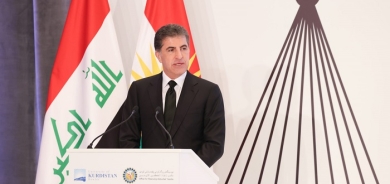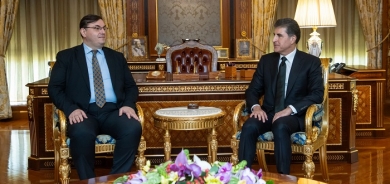Prime Minister Barzani talks on regional situation at MERI Forum

First, Prime Minister Barzani expressed condolences on the death of Dr. Ahmad Chalabi, a prominent Iraqi politician, saying his passing is a major loss for all Iraqis.
He expressed his appreciation to MERI and thanked the Turkish Foreign Minister for his attendance.
He then noted a strategy by the Kurdistan Region towards becoming a focus of stability in the Middle East that builds strong political and economic relations with its neighbours.
Prime Minister Barzani said the Kurdistan Region values its relationship with Turkey as an important neighbouring country that played a vital role in implementing the 1991-2003 no-fly zone. He specifically pointed out the role of the Late Turkish President Turgut Özal in supporting the no-fly zone, established by the US-led allied countries, protecting the Kurdistan Region from the regime of Saddam Hussein. He also remarked on how Turkey helped the Region’s people who sought refuge during Iraq’s chemical attacks in August 1988.
He noted that since the Justice and Development Party AKP assumed power, a strategic relationship has developed that benefits Iraq in general and the Kurdistan Region in particular.
Regarding the current situation in Iraq, Prime Minister Barzani said that the Kurdistan Region has been waiting for twelve years to see the Iraqi Federal Constitution implemented, and that it cannot wait further.
He stressed that without substantial, serious progress on the implementation of the Federal Constitution, an alternative approach to the future of Iraq will become necessary. He reiterated that no matter what option Kurdistan Region chooses in the future, Baghdad will remain a main partner.
“Whatever decision the Kurdistan Region will make, including independence which is its legitimate right, it will have strategic relationship with Baghdad. This is a fact and the framework of the Region’s policy,” he added.
Prime Minister Barzani said that the current priority is to protect the Region from the Islamic State terrorist organisation, ISIS, along a one thousand kilometre frontline. He said that since the start of the war, the Region has made major sacrifices, including 1,300 martyrs and 7,000 injured. He expressed his appreciation to all countries that have been supporting the Region, including Turkey, Iran, European Countries, and at the top, the United States; their substantial and continuing assistance, he said, have been vital to effectively confronting ISIS.
Since the people of Kurdistan suffered from decades of oppression and war, Prime Minister Barzani said that after the overthrow of the regime of Saddam Hussein in 2003, the Kurdistan Region focused on reconstruction, institutionalisation and development of a solid economy.
“It has been a time for rebuilding government organisations and pursuing major infrastructure development. We never thought we would face a barbaric terrorist group such as ISIS. We assumed it was the Iraqi army’s duty to secure borders outside the Kurdistan Region,” he said
He pointed out that the Kurdistan Region goes through a transitional period that calls for patience. He said, establishing democracy, pursuing state building, and promoting the rule of law cannot be simply imported into our Region and adopted, it is a process that takes much time to be genuinely realised.
Regarding internal issues, Prime Minister Barzani said the eighth cabinet was formed as a broad-based government, including all major political parties, to resolve issues by consensus. He stated that sometimes, when an unexpected situation emerges, “it happens that the only options are bad or worse. We selected the bad not worse, although the worse option was available. The recent unrest and complexities, however, do not mean that political parties cannot meet and involve themselves in direct negotiations. All issues must be resolved through dialogue and negotiation”.
Prime Minister Barzani stressed that stability is always a top choice. He said efforts have been doubled to protect peace and stability while facing formidable challenges, like fighting ISIS and accommodating around two million refuge seekers in the midst of severe financial constraints.
Regarding an expected visit of a Kurdistan Regional Government, KRG, delegation to Baghdad and holding a new round of negotiations, Prime Minister Barzani said this does not mean that KRG oil policy has not been successful.
He said, the fall in oil price has caused many difficulties for both Baghdad and Erbil, but that does not mean that the Region’s oil Industry and economic policy has not been adequately planned and effectively implemented; rather, it has been built very competently. He stated that Baghdad knows the Kurdistan Region has options, but the priority remains that both sides work together to reach agreement on issues, otherwise a new approach has to be found.
Prime Minister Barzani said, “It is normal for Baghdad to know Kurdistan’s oil data, including the price of oil and the mechanism of marketing, in a very transparent way. But the Region will never allow control of Kurdistan’s oil industry by Baghdad.”
He further explained that after an agreement was reached over oil and budget at the end of 2014 the KRG was patient when Baghdad sent less than what was expected during the first two months of 2015. But in the third month when the Region’s oil exports increased, Baghdad continued sending less than agreed, it even subtracted further $50 million without consulting the Region. With bad faith that resulting in distrust, Prime Minister Barzani said the KRG finds it increasingly difficult to continue this situation with Baghdad.
He expressed his appreciation to the Turkish Government that opened the economic gate and oil export route. He also hoped that the KRG will reach agreement with Baghdad that would benefit both the Region and country as a whole.
Responding to a question about the situation in Turkey, particularly about the fight between this country and Kurdistan Workers Party, PKK, Prime Minister Barzani said, “It is a Turkish internal issue that must be addressed inside Turkey.”
Comparing the Kurdish situation in Turkey before and after AKP assumed power, he said there had been several achievements for the Kurdish people, particularly the peace process and reducing conflict. He expressed his hope that the current difficult situation would be reconsidered by all sides, and the peace process resumed with problems being resolved through dialogue and negotiations.
Responding to another question about the political situation in the Region, Prime Minister Barzani said that the KRG eighth cabinet was founded on consensus and agreement and based on mutual trust and understanding that over four years the business of government would be conducted in a peaceful manner. But the agreement was broken, a new framework must be defined, and the political coalition revised as necessary. He expressed his hope that all issues would be resolved through negotiations and mutual understanding, reiterating that the political measures taken recently meant to stop development of the unrest.
Regarding Syria, Prime Minister Barzani said the situation must be resolved by a political solution that will be acceptable to all Syrian sides, and that the solution must bring an end to the suffering of all the sections of Syrian people.















